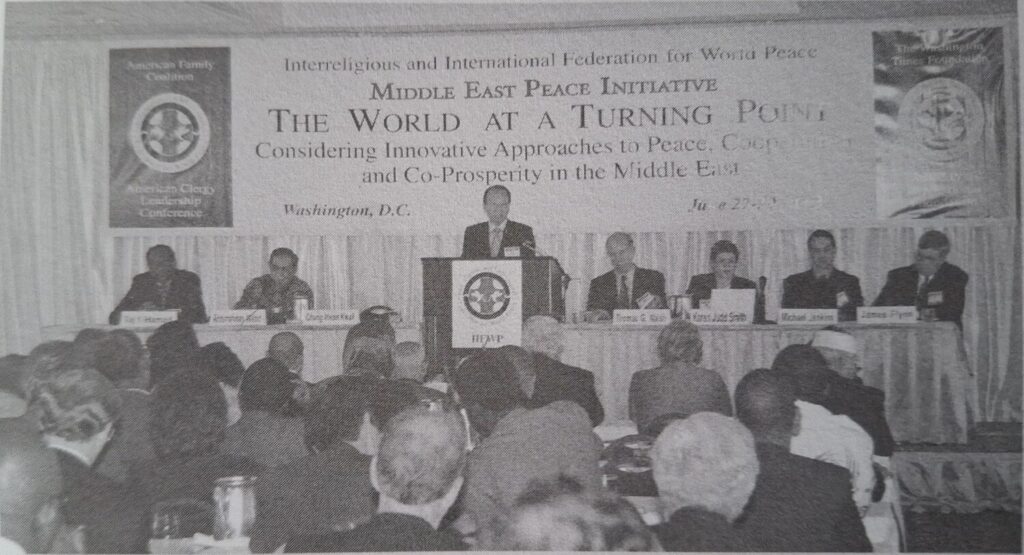Defend Yourself Without Killing the Innocent

By: K.H. Abdurrahman Wahid
Former President of Indonesia
I recently came from Israel, where I observed two different responses to the roadmap to peace just mentioned. I had a meeting with Mikhail Gorbachev, F. W. de Klerk of South Africa, and Ariel Sharon, the prime minister of Israel, who informed me that Israel would negotiate with the Palestinians if they sack Yasser Arafat. He said this many times in our two and a half hours of meetings, which were filled with differences of opinion between the four of us.
I also met with Shimon Peres, leader of Israel’s Liberal Party, and he said peace talks between the Israelis and Palestinians could go on without condition of Arafat leaving. This morning we got the news that the negotiators have agreed to withdraw Israeli forces from all Palestinian towns in the West Bank and Gaza strip for three months. We don’t know if this means Arafat is leaving or not. We will have to wait several days to learn this.
In Iraq, now that Saddam Hussein is gone, whoever leads the country will have to negotiate and make peace with the followers of Hussein. Why? Because the other side will be seen as puppet of a foreign country. That is why, in order to bring real peace to the Mideast, negotiations in Iraq must be directly linked with the peace talks between the Palestinians and Israelis.
But our job here is not to focus only on political questions. Politics is indeed one part of the effort to establish peace in the Middle East. However, it should also be related to education, to cultural life, to religion, to language, and so forth. And, as Rev. Dr. Kwak said this morning, politics is not the primary domain of our thinking today. We have to think in more general terms, and politics is only one part of the process.
Since I am a politician, it is understandable that I would report on the political side of these issues. But, as said by Rev. Dr. Kwak, our efforts should be related to different facets of life. I understand this, and I hope that view will prevail in this meeting, because for those Muslims attending this conference, politics is paramount. Do you know why? Because in Islam the connection between politics and other areas is very strong. Even the idea of an Islamic state is still voiced by people in the Islamic world.
Our founding fathers of the Republic of Indonesia, back in 1945, rejected an Islamic state there. They dealt with the question of whether it is obligatory for Muslims to defend what was then known as the Dutch East Indies, which was ruled by non-Muslims, the Dutch colonialists. Their answer was “yes,” it is obligatory, because then Muslims would be free in that area to observe Islamic teachings and formulate Islamic law. This strengthens what was written by the author of a very old book in an area that was formerly an Islamic kingdom: Whatever kingdom exists at the present time has to be defended.
On October 20, 1945, we declared the defense of the Republic of Indonesia, a non-Islamic state, to be a religious duty, what we call jihad, not in order to destroy our enemies, but only to defend ourselves. This is important to note, that just because you are defending Palestine, it does not give you the right to kill people in terrorist acts.
Back in 1994, I requested permission from my elders in the religious council to sign a joint statement with the chief rabbi of Israel, on television. The council asked me to read the English ver-sion and translate it into Indonesian, and as soon as I finished it, I was informed that I had to change one word.
There is a sentence in both Islam and Judaism which says that we reject the use of violence that results in the death of innocent people. But whether someone is “innocent” or not is not up to us to decide, it is God’s judgment. So I was told to change “innocent” people to “non-guilty” people, because determining if someone is guilty or not is our work. As human beings, we have to judge if somebody is guilty or non-guilty.
So my feeling is that it’s better to use the term “non-guilty” instead of “innocent.” Here I would like to close this speech and say thank you very much.